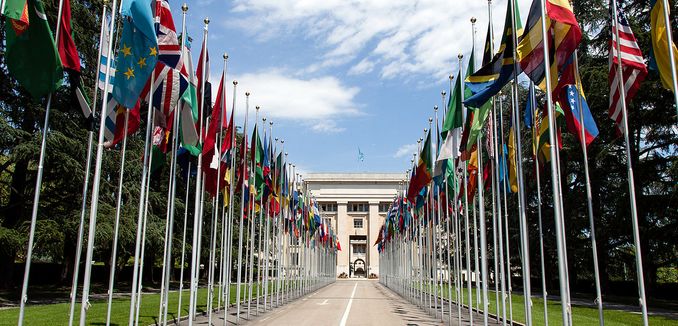While human rights are violated worldwide and thousands have been killed in Syria, Iraq, and Yemen, only Israel “has its record inspected at every single session of the United Nations Human Rights Council (UNHRC),” the Associated Press reported Monday.
From all the nations in the world, only Israel is subject to a permanent agenda item — Item 7 — that forces the UNHRC to review “the human rights implications of Israel’s occupation of Palestinian territory” during every session. “The standing item at the 10-year-old council has come to exemplify the spotlight on Israel in a number of U.N. bodies,” the AP noted.
Out of 233 country-specific UNHRC resolutions passed in the past decade, more than a quarter of them — 65 — have focused on Israel. About half have been condemnatory. Syria, where over 250,000 have been killed and more than 10 million displaced since 2011, has been subject to 19 resolutions.
“The U.N. continues to single out Israel, the one liberal democracy in the Middle East,” David Keyes, formerly a human rights activist and now a spokesman for Israeli Prime Minister Benjamin Netanyahu, told the AP. “Imagine that. A country with free speech, free elections and minority rights is condemned more than mass murdering dictatorships like North Korea, Iran and Syria. That speaks for itself.”
UN Secretary General Ban Ki-moon criticized the UNHRC’s singular focus on Israel shortly after assuming his post in 2007, saying that he was “disappointed at the council’s decision to single out only one specific regional item, given the range and scope of allegations of human rights violations throughout the world.”
Recent UN actions that have targeted Israel include a UNESCO resolution that denied the Jewish connection to the Western Wall and referred to other Jewish holy sites in Israel as “so-called”; a UNHRC resolution in March to create a database of businesses operating in the West Bank and Golan Heights; and UNHRC chief Zeid Ra’ad al-Hussein’s claim that Israel’s revocation of travel permits to residents of the West Bank and Gaza Strip following a deadly terror attack in Tel Aviv amounted to “collective punishment.” Israel’s mission to the UNHRC blasted Zeid for “using the murder of innocent Israelis to attack Israel.”
One of the driving forces behind the UN’s focus on Israel is the influential Organization for Islamic Cooperation, which often spearheads the push for these resolutions, the AP explained. Rich nations are also able to use their resources to prevent scrutiny of their behavior, as Saudi Arabia did when blocking UN efforts to investigate its airstrike campaign in neighboring Yemen.
Earlier this year, U.S. Ambassador to the UN Samantha Power underscored the injustice of the UN’s singular focus on Israel:
As you all know, the UN Charter guarantees “the equal rights of nations large and small,” and yet we have seen member states seek to use the UN Security Council, the General Assembly, and even the most arcane UN committees in ways that cross the line from legitimate criticisms of Israel’s policies to attempts to delegitimize the state of Israel itself. The only country in the world with a standing agenda item at the Human Rights Council is not North Korea, a totalitarian state that is currently holding an estimated 100,000 people in gulags; not Syria, which has gassed its people – lots of them. It is Israel.
Bias has extended well beyond Israel as a country, Israel as an idea – it even extends to Israeli organizations. Some of you may know the group ZAKA – an Israeli humanitarian group that helps save lives in disasters and ensures proper burial for the victims of those tragedies. ZAKA not only works here in Israel, but it responds to natural and manmade disasters worldwide, as it did in New York after 9/11, and in Haiti after the 2010 earthquake. Yet when ZAKA was nominated in 2013 for accreditation by the UN’s NGO committee – and this accreditation is what gives NGOs the right to participate in UN meetings, the right to assert their voices, the right to raise causes that really can matter in the world – when ZAKA was put forward it was denied approval. Five subsequent times the committee met, and five times member states blocked ZAKA – not because of the quality of its work, people weren’t that interested in the quality of its work, but simply because ZAKA is an Israeli organization.
[Photo: Tom Page / WikiCommons ]




